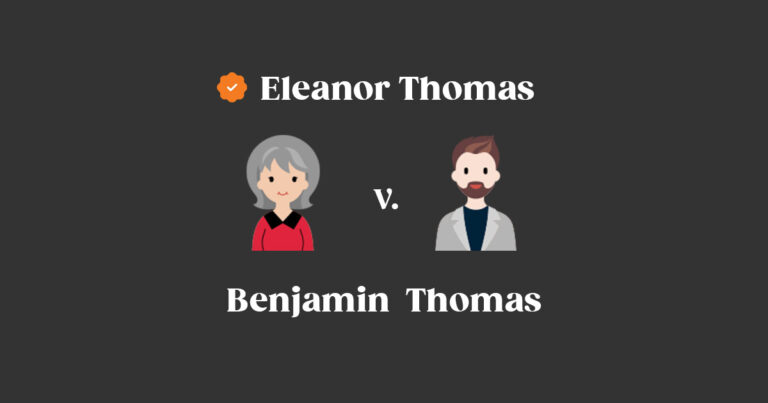Quick Summary
John Thomas made provisions in his will for his wife, Eleanor (the plaintiff), to have a life interest in one of his houses. His brother, Samuel Thomas (the defendant), who inherited all the houses, signed a formal agreement with Eleanor to rent the house for just £1 per year, following John’s wishes. However, his executors broke the contract when Samuel passed away by taking legal action to evict Eleanor from the house.
They argued that Eleanor had not provided any consideration for the agreement and, therefore, the contract was invalid.
Eleanor brought a lawsuit against the executors to uphold the terms of the contract. The court ultimately ruled that the £1/year rent clause and the requirement for Eleanor to maintain the property were sufficient considerations for the contract to remain enforceable. For a contract to be binding, both parties must exchange promises or something of equal value.
Facts of the Case
John Thomas owned several properties and made a will for them to be transferred to his brother Samuel after his death. John told two witnesses the night before he died that he wanted his wife, Eleanor Thomas (plaintiff), to have a life interest in his particular house in Merthyr Tydfil.
In recognition of the late husband’s desires, Samuel signed a formal agreement with plaintiff. According to the agreement, the plaintiff must pay £1 per year as the rent of the house and keep it in good repair.
For several years, the contract between Samuel and Eleanor was carried out as written. However, when Samuel passed away, his executors (Benjamin Thomas) breached the contract with Eleanor by bringing an action for ejectment based on unequal consideration of the agreement.
Procedural History
- Eleanor Thomas filed a lawsuit against Benjamin Thomas for non-performance of the agreement.
- The defendant argued that the plaintiff had not provided any consideration for the agreement, so there was no contract.
- A verdict was obtained in favor of Eleanor Thomas on all issues.
- Benjamin Thomas requested to dismiss the case and was granted a conditional order, known as “Rule Nisi.”
The rule nisi sets a deadline for the party to present arguments or evidence challenging the judgment. If the party fails to satisfy the court with sufficient cause, the rule nisi will become absolute, and the judgment is finalized.
I.R.A.C. Format
Issue
Whether the agreement between Eleanor, Benjamin and Samuel Thomas was supported by a valid consideration.
Rule of Law
A contract is enforceable if both parties agree to its terms. However, it may be deemed unenforceable if the value of the consideration is inadequate, the contract is illegal or against public policy, or it violates the law.
Reasoning and Analysis
According to the court’s ruling, consideration must be something of legal worth that the parties agree on.
Because it contained a provision for a yearly rent of £1, the court found that the agreement between the executors and Ms. Thomas was not a mere gift.
The tenant agreed to pay a yearly rent of £1 and maintain the property in exchange for the right to occupy the property. These promises or performances given by both parties were sufficient to create a binding contract.
Courts do not evaluate the sufficiency of the consideration or the equality of the trade, but they will need to be worth more than a nominal sum. Therefore, the bargained-for condition was not a significant factor in terminating the contract.
Conclusion
The court ruled in favor of Eleanor Thomas because both parties were exchanging something of value, as Eleanor agreed to pay an annual rent of £1 and maintain the property in exchange for the right to occupy it.
Key Takeaways
- An agreement must contain a valid consideration, which should be of some value in the eyes of the law.
- Respect for a testator’s intentions does not form part of the legal consideration in an agreement.
Relevant FAQs of this case
What qualifies as valid consideration?
A valid consideration is defined as something of value given in exchange for a promise or a service.
This value can take the form of money, but it does not have to be financial. It may also take the form of services or even something intangible, like an agreement not to do something in return for the consideration provided.
What are the common forms of considerations?
- Monetary Value
Monetary or equivalent consideration is the most common form of exchange. - Performance
Promise to perform or not perform some action. For example, when you purchase insurance on your home, you receive consideration which is (a promise made by your insurance company that they will pay your home’s repair costs if it’s damaged by fire). - Refrain from taking action
The third and least common type of consideration is a promise by one party to refrain from taking some action (or promises not to sue another party for some reason). Indeed, all three ways of accounting for value are acceptable. In any case, all three forms of consideration are valid.
What considerations do courts consider when deciding whether or not to enforce a contract?
When determining the enforceability of a contract based on consideration, a court will consider the following factors:
- Whether there has been an exchange of promises or something of value between the parties.
- Whether the consideration exchanged is legally sufficient, meaning that it has some value in the eyes of the law.
- Whether the consideration exchanged is worth more than a nominal amount.
- Whether the contract involves illegal activities or is against public policy.
- Whether the contract is otherwise against the law.
The court will generally not consider the fairness or equality of the exchange. However, it will focus on whether the parties have exchanged something of legal value in order to create a binding contract.
Was this case brief helpful?
